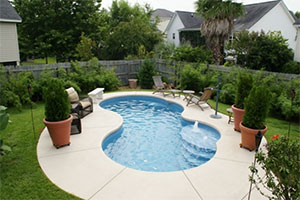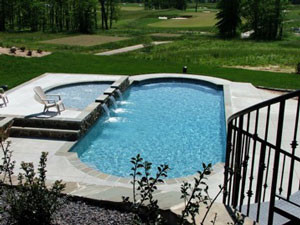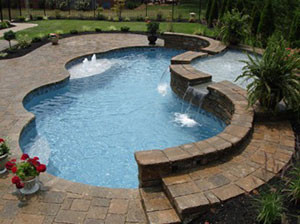Fiberglass Pool Construction
NOTICE: Through the years, we have offered fiberglass pools as an option. However, CURRENTLY WE ARE NOT OFFERING this type of construction due to certain logistics including labor, availability, pricing and preference. Still we want to supply you with the following information for comparison purposes.)

One of the first things many people ask us is, “What’s the difference between fiberglass pools, vinyl liner pools, and concrete or gunite pools?”
Here you will find the advantages and disadvantages of the one-piece Fiberglass pool construction. In addition, this page will inform you of the differences in many fiberglass pools (shells), how they are installed, and how fiberglass pools hold up in the clay soil in the Jackson, MS area.
Fiberglass Pool Advantages:
- Lowest maintenance. The solid surface of a fiberglass pool is nonporous. This reduces the risk for algae growth and the amount of sanitizing chemicals required to maintain the pool.
- Little or no lifetime cost on some surfaces. Fiberglass pools have no surface requiring replacement.
- Although we list this in the advantages section, please note the disadvantage below. Some fiberglass pool will require repair on the surface due to cracks and blistering. Know which surface you are buying. At the time of this writing only one fiberglass pool offers a true “little or no lifetime cost” on its surface – Trilogy Pools.

- Non-abrasive surface. The solid surface of fiberglass pools is smooth to the touch and comfortable to swimmers.
- Built-in seats, tanning ledges, and steps. Many fiberglass pool designs include seating areas and walk-in steps incorporated into the shell of the pool.
- Quick installation. The average installation time of a fiberglass pool in the Jackson, MS area is approximately 3-4 weeks.
- Minor Surface Repairs can be simple. Some surfaces found on fiberglass pools are easily repaired in the event that scratches or surface cracks appear. This can even be accomplished with very little if any visual evidence of the repair. However, there are other surfaces that are not as easily repaired and repairs are visible. Know what you are buying.
- Some reliability in the clay soil of Jackson, MS. The fiberglass shell has a lot of flexibility and strength, allowing it to move and shift with the clay soil without damage. Still the soil can cause the pool sides to bulge. (Disclaimer: Shifting and movement by clay soil can cause any type of construction to have issues. The statements made here are not meant to indicate otherwise.)
Fiberglass Pool Disadvantages:
- Higher initial cost. Fiberglass pools cost on average $8,000.00 – $18,000.00 more than a comparable sized vinyl liner pool.
- Surface repair difficult and costly. Fiberglass pools that have a gel coat will usually repair some repair during its lifetime. This repair is based on damage (cracking and blistering) but can be costly. It is also difficult to find someone skilled at this repair. Incidentally, at the time of this writing, all fiberglass manufacturers used a gel coat on their shells except Trilogy Pools. Thus it is the only fiberglass pool we sell.
- Limited shapes and designs. Most manufacturers have a limited supply of molds from which the fiberglass shells are made. Thus consumers are limited to the shapes and sizes and depths offered by the various fiberglass pool manufacturers.
- No wider than 16′. Fiberglass Pools must be transported by means of the roads. Currently shipping restrictions limit the width of the fiberglass pool shell to 16′.
- Pool Depth. Very few fiberglass pools are certified for diving.
- Draining pool can be dangerous. Due to the nature of the product, care must be taken when draining a fiberglass pool. If the water table (ground water) is high, a fiberglass pool can be lifted out of the ground, causing extensive damage, if not drained properly.
- Warranties vary greatly. Be sure to check out the warranty, what it covers and what it does not. Most warranties are pro-rated. Know what you are getting.
Differences in Fiberglass Pool Shells
 Not all fiberglass pool shells are made the same. Each manufacturer is going to have their distinct way of manufacturing and strengthening the shell. In addition, each shell has its own surface type. Most manufacturers use a gel coat. This type of surface can crack or blister over time and is not easily repaired. In addition, the repair is usually visible.
Not all fiberglass pool shells are made the same. Each manufacturer is going to have their distinct way of manufacturing and strengthening the shell. In addition, each shell has its own surface type. Most manufacturers use a gel coat. This type of surface can crack or blister over time and is not easily repaired. In addition, the repair is usually visible.
What we used: CURRENTLY WE ARE NOT OFFERING THIS TYPE OF CONSTRUCTION due to certain logistics including labor, availability and pricing. However, there is one shell on the market that stands out more than all others. It’s manufactured by Trilogy Pools. The surface is called HydroStone. It is similar to Corian counter tops, easily repaired and usually not visible if repaired. We are so impressed by this fiberglass shell with Hydrostone that it is the only one we would ever recommend to customers.
How Fiberglass Pools Are Installed – A Simplified Summary
Most fiberglass pools have a similar installation process. A hole is excavated to the fiberglass shell’s specifications. Some type of sump or pumping mechanism is installed to protect the pool when the need arises to drain it in the future. The shell is then lowered into the hole. A suitable material is used to circumvent void spots under shell.
What we did differently: Most manufacturers use or recommend sand as a leveling agent. However, our experience is that sand is wasted away over time due to ground water, once again leaving void spots. These void spots can cause issues with the fiberglass shell’s longevity. Due to this issue we use a specific type of rock that remains in place over time.
Fiberglass Pools and the Clay Soil in Jackson, MS Area
Fiberglass pool shells have a lot of flexibility and strength. This allows the shell to move and shift with the clay soil without damage. However, the clay soil in the Jackson, MS area has the tendency to shift significantly. There are preventative measures that can be taken, specifically in the areas of drainage. Still there is nothing that can completely prevent the soil from moving. Fiberglass shells do have limitations to their flexibility. And these limitations can be put to the test by the Jackson, MS clay soil.
(Disclaimer: Shifting and movement by clay soil can cause any type of construction to have issues. The statements made here are not meant to indicate otherwise.)
For some detailed information about other types of construction, click on the following links:
Vinyl Liner Gunite


 Not all fiberglass pool shells are made the same. Each manufacturer is going to have their distinct way of manufacturing and strengthening the shell. In addition, each shell has its own surface type. Most manufacturers use a gel coat. This type of surface can crack or blister over time and is not easily repaired. In addition, the repair is usually visible.
Not all fiberglass pool shells are made the same. Each manufacturer is going to have their distinct way of manufacturing and strengthening the shell. In addition, each shell has its own surface type. Most manufacturers use a gel coat. This type of surface can crack or blister over time and is not easily repaired. In addition, the repair is usually visible.